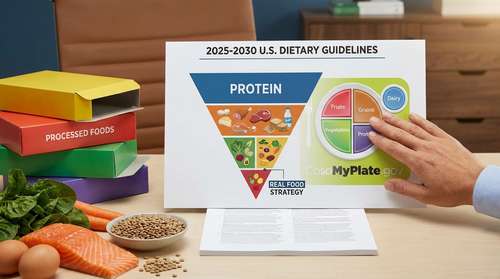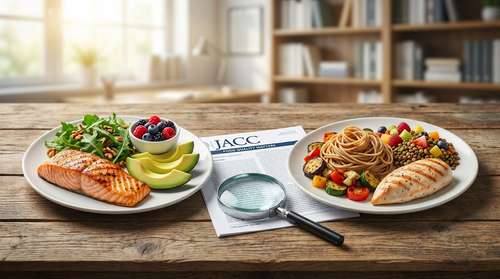The Hidden Dangers of Ultra-Processed Foods
Many of us enjoy the convenience and taste of quick meals packed with flavor and easy to grab on the go. But have you ever stopped to consider what might be hidden in these foods? Eating ultra-processed foods has been linked through research to a host of troubling health conditions that affect millions. These foods, often loaded with additives, preservatives, and artificial ingredients, might be undermining our efforts to stay healthy. In today's article, we explore the relationship between our dietary habits and significant health risks.
While it might be hard to resist the allure of freshly wrapped snacks, the hidden risks are something we can no longer ignore. When we talk about ultra-processed foods, we’re speaking of items that have been heavily modified from their original form. They are convenient and are marketed as a quick meal solution, but research shows that such foods are often linked to chronic illnesses and disease prevention becomes more challenging with each bite.
Understanding Ultra-Processed Foods
Ultra-processed foods are not your average home-cooked meal. They are industrial formulations typically made with five or more ingredients. Some of these include substances you wouldn’t even be able to pronounce easily. This section looks into what exactly counts as ultra-processed and why it’s so concerning for our overall health.
Ultra-processed foods include items like sodas, ready-to-eat meals, processed meats, and packaged snacks. The key difference between these foods and whole, natural foods is that UPFs are often packed with food additives and synthetic ingredients meant to boost flavor, shelf-life, and appearance. A handy way to understand this is to consider that while fresh fruits and vegetables nourish our bodies naturally, ultra-processed alternatives work like a short-term fix that might come with long-term damage.
Many experts wonder, can convenience ever outweigh long-term health? Evidence suggests that it often does not, especially when we consider the impacts on conditions such as obesity, cardiovascular diseases, and type 2 diabetes. Indeed, our dietary choices play a huge role in chronic illnesses, and ultra-processed foods seem to be a double-edged sword in our modern food landscape.
The Health Impact of Ultra-Processed Foods
Eating a diet heavy in ultra-processed foods has been linked to multiple health conditions, and this section dives into those connections by shedding light on processed food risks. If you think one or two occasional indulgences are harmless, you might want to take another look. When consumed regularly, these foods expose our bodies to risks that extend far beyond momentary satisfaction.
When discussing diet and health, many studies show that ultra-processed foods are directly associated with weight gain, high blood pressure, and high cholesterol. You might recall reading about a study that linked higher consumption of UPFs with a surge in type 2 diabetes rates. Over time, the harmful additives and high levels of salt, sugar, and unhealthy fats can trigger inflammatory responses and metabolic imbalances in the body.
It’s not just about one condition either. The health impact builds as these foods contribute to a vicious cycle of poor nutrition which weakens the body's natural defenses. In simple terms, eating unhealthy foods can be like throwing sparks into a dry forest—one small flame can lead to a raging wildfire of chronic illnesses.
Major Health Conditions Linked to Ultra-Processed Foods
Now let’s break down the 12 major health conditions that research suggests can be linked to consuming ultra-processed foods. This section details the potential consequences our bodies might face if we continue relying heavily on these foods. We’ll witness how different parts of our system take a hit from unhealthy eating patterns.
The conditions include obesity, cardiovascular diseases, type 2 diabetes, high blood pressure, and certain types of cancer. Additional connections have been observed with metabolic syndrome, liver and kidney diseases, and even mental health issues like depression and anxiety. Some studies have also raised red flags about links to digestive disorders, immune system dysregulation, and hormonal imbalances.
These links are not merely coincidental. Researchers have long suspected that the components of ultra-processed foods—namely food additives and chemicals—play a role in triggering inflammatory processes. For example, additives that enhance flavor might also prompt the body to produce inflammatory markers, thereby increasing the risk of chronic illnesses. It becomes all too clear that when our diet is filled with processed food consequences, our long-term health inevitably suffers.
Such findings might make you wonder: Is it too late to make a change? The answer is definitely no. Understanding these risks empowers us to make better dietary decisions. It might be a bit like recalibrating a car that has been running on low-quality fuel for too long—you want your body to function at its best.
Public Health Concerns & Dietary Habits
The widespread consumption of ultra-processed foods has raised major public health concerns. In this segment, we look at how policy choices and consumer trends intertwine when it comes to disease prevention and dietary habits.
Numerous public health experts argue that government policies should better address the impact of ultra-processed foods on community health. With processed food risks becoming more evident each day, communities need to be educated about the dangers of such dietary choices. Some officials in public health departments have begun advocating for clearer labeling on food products, aiming to inform consumers about additives and potential health risks.
Consider the prevalence of food-related diseases in modern society: they are on the rise not just because of genetic factors, but largely due to dietary habits. Public health, therefore, finds itself at a crossroads. While manufacturers promote ultra-processed foods for their convenience, policymakers are urged to develop guidelines that prioritize nutrition over profit. It’s a tug-of-war between immediate gratification and long-term wellness.
Even though it can seem overwhelming, small changes in our daily food choices can contribute to significant improvements over time. As one nutrition advocate recently noted, being mindful of what we consume isn’t just about watching the scale—it’s about protecting our overall quality of life. And when you think about it, isn't our health our most prized possession?
Looking Forward: Rethinking Our Food Choices
Every single day offers us a new opportunity to rethink our food choices. In this final section, we reflect on how the evidence on ultra-processed foods should inspire us to change our diets for the better. Our future depends not just on advancements in medicine but on everyday actions that steer us towards improved health.
While convenience often drives our decisions at the grocery store, the long list of health conditions linked to ultra-processed foods should give anyone pause. It’s like choosing between a short-term pleasure and long-term well-being. Personally, I find it helpful to plan my meals in advance and incorporate natural foods that not only taste great but also protect against chronic illnesses. This mindful practice has given me the energy and focus to make better choices every day.
There is a growing call for more public health initiatives that would not only educate consumers but also regulate the production and labeling of these heavily processed items. As we continue to learn more about the processed food consequences, it becomes essential to incorporate dietary habits that support disease prevention and optimal health outcomes.
Changing the way we eat doesn’t happen overnight, but every step matters. Whether you are swapping out one processed snack for a piece of fruit or rethinking your entire approach to dinner, every decision you make contributes to a healthier future. So, why not start today?
Conclusion
Ultra-processed foods may seem like an effortless solution for busy lifestyles, but their hidden costs extend far beyond the grocery bill. With links to 12 major health conditions—including obesity, cardiovascular diseases, and type 2 diabetes—it's clear that the benefits of convenience come at a steep price. Through understanding the risks and making intentional dietary changes, we can protect our health and build a strong foundation for the future. The steps we take now in rethinking our food choices can create a ripple effect, leading to improved public health and long-term wellness.




